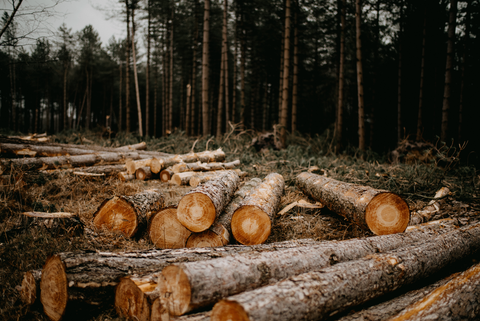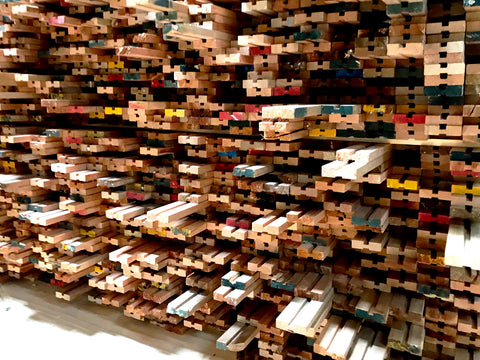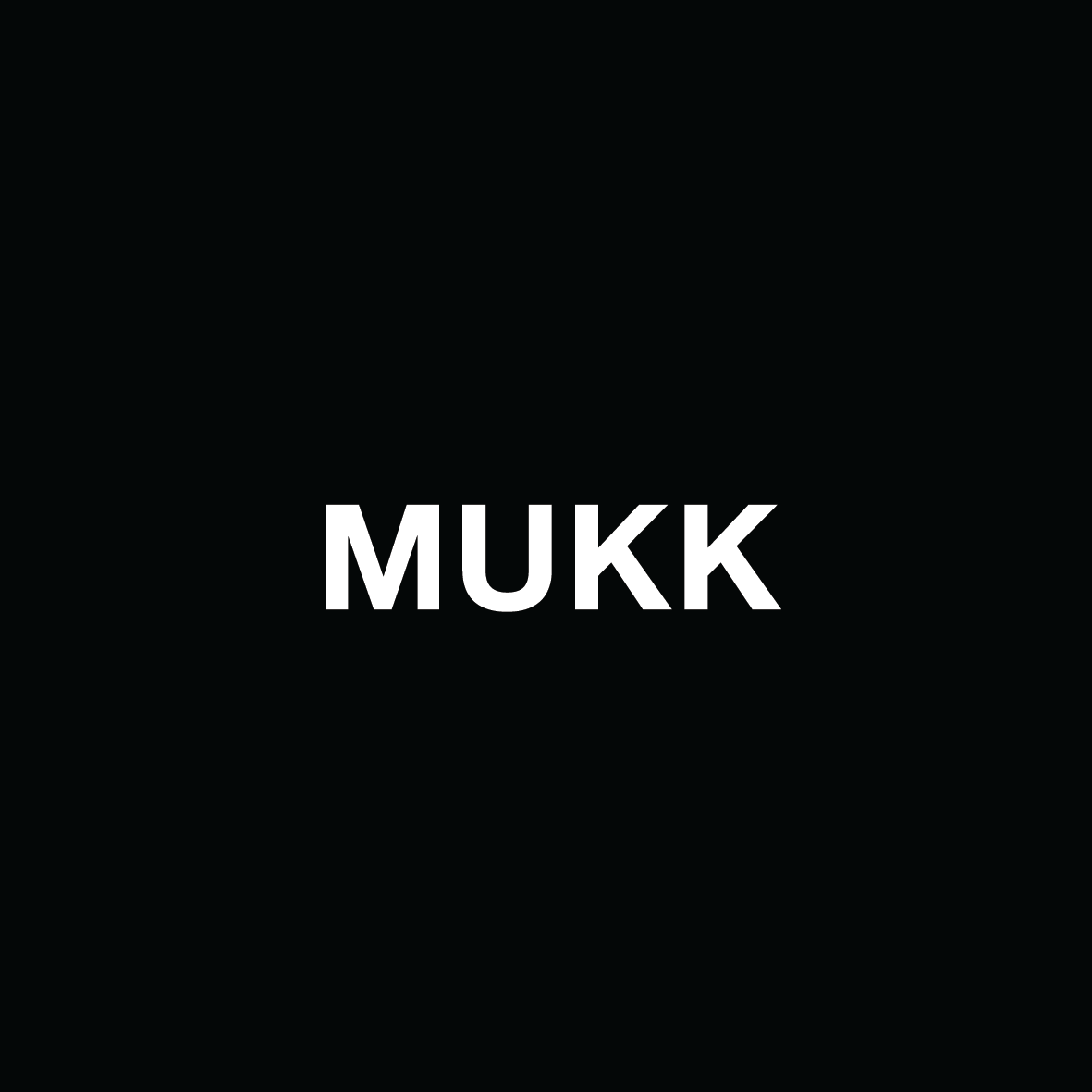90% of MUKK products are made from recycled waste. We do not utilise new timber in the making process; through this action, we hope to preserve one extra tree on the planet unharmed. We think that reclaimed wood is more sustainable than certified wood when it comes to creating small objects & home décor products. Suppose you’re familiar with how the timber industry operates. In that case, you will know that four categories of wood exist in our market: certified timber, legally licensed timber, recycled timber, and illegally logged timber.
What is new lumber?
New lumber is a term used to represent a new plank of material purchased directly from a saw miller. The local wood size will usually be calculated in metric tons; singular planks will be calculated in ft length, with variations of width & thickness. Sawn timber planks can go up to 15ft long or longer. Imported wood is calculated based on M3 and dimensions in metrics.

Image: Fallen Trees.

Image: Stacked logged trees.

Image: Stacked lumber after processing.
What are the criteria for recycled materials?
Forest Stewardship Council (FSC) stated that recycled products are pre-consumer reclaimed material, which is a material that is reclaimed from a process of secondary manufacture or other downstream industry, in which the material has not been intentionally produced; is unfit for end-use; is not capable of being reused on-site in the same manufacturing process that generated it. Examples include sawdust, damaged stock, and off-cuts.
According to the United States Environmental Protection Agency (EPA), recycling is collecting and processing materials that would otherwise be thrown away as trash and turning them into new products. Recycling can benefit your community and the environment.
To fulfil the FSC Recycled label, the criteria of recycled products require products to be made from at least 70% post-consumer reclaimed materials, i.e., wood or wood fibre that has been reclaimed from a product after that product has been used for its intended purposes by individuals or businesses. The remaining materials must have been verified as pre-consumer waste. For MUKK, our products designed & produced from recycled material range from 80%-100% off cuts.
What are off-cuts?
Off cuts – also known as production waste, are pieces of waste material left behind after cutting a more significant part of the timber.

Image: Stash of accumulated recycled wood in the form of off cuts
The challenges when using recycled wood?
If you’re familiar with woodworking and have been purchasing sawn timber, you will have the knowledge that sawn timber ends are colour painted. Apart from identification, this application is used to seal off end grain pores to prevent rapid drying during the kiln dry process that may result in wood checks – cracks and splits.
Upon processing the timber for projects, we will cut off both ends of the wood tip to remove the painted edge and, at the same time, remove wood checks that are most likely to appear at both ends of the sawn timber. Therefore by using these types of off cuts, it tends to have wood checks; we have an extra process of sorting these off cuts, checking sizes & remove extreme wood checks with a fancy name-off cuts management.
The difference between using brand new lumber is that we have to sort these off cuts with extra care & sometimes one by one depending on the products that we are creating, as different products have additional requirements such as the reliance on strength or structure in which case we will have to evaluate if the wood checks will be an issue or not. However, after years of experience with off cuts, we tend to realise & understand them better & most of the time, these wood checks do not pose any durability issue, especially even more so for small decorative objects; today, we are starting to embrace of these off cuts as it is, celebrating the natural cracks of the wood as part of the beauty of our design.

Image: Off cuts from painted wood ends used to make our signature Band Frames.

Image: Featuring Band Frame Mini in four different species of wood.
The biggest challenge we currently face is the quantity of recycled wood we can obtain to keep up with the order. In the mass-production context, it’s all about how many orders & sales you can make; the more, the better; for us, it’s the total opposite. When we rely on off-cuts only as materials to produce small objects, we know that our profitability may be tied down, and in hindsight, it makes no business sense for scalability.
The first step is to estimate how many quantities we can produce out of this cycle of off-cuts. For example, for this cycle, out of each batch of Merpauh off cuts, we can produce up to an estimated 100 pieces of Pixel Butcher Block. Yet, we have to struggle between market pricing and competing with mass-produced items that could produce up to 5000 units or more per month & sell at a variety of price points. Having the consumers understand the differences we stand for will be our next challenge & adventure.
For certain species of wood, we must wait for the production cycle to accumulate; we may not always have this type of wood as we can't predict accurately what type of off-cuts will be available next. Therefore, we have categorised such products as seasonal items, i.e., our Pixel Butcher Block & Wild Jungle cutting boards.

Image: Material preparation of Tulipwood (Yellow Poplar) off-cuts to be made into Wild Jungle Cutting Board.

Image: Wild Jungle End Grain Cutting Board.
Our vision of honest design & sustainability.
Since the founding of our company in the year 2015 till date 2022, we have transitioned from using uncertified wood to certified wood and moving one more step forward - recycled wood. Using waste will be more sustainable than using a fresh new plank of timber, especially in home décor products; we have the choice to choose better options on how we consume. We hope to create a positive impact by providing consumers with another alternative to shop for beautiful & conscience-free products. Not all beautiful products are created equal; some are better in all aspects.
Chia Yi is the Founder of MUKK, a Multi-Award-Winning Industrial Designer with ten years of experience in the design & manufacturing sector of the furniture industry in Malaysia, majoring in BA (Hons) in Product Design Futures & MSc Ergonomics & Human Factors.

